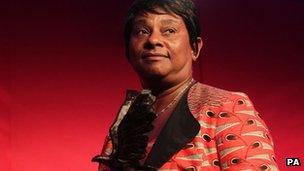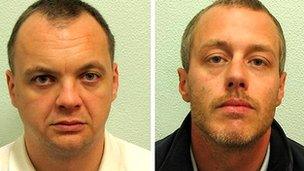Stephen Lawrence anniversary: Racism fight goes on
- Published
What has changed in our institutions and society in the 20 years since black teenager Stephen Lawrence was murdered?
Twenty years ago the murder of Stephen Lawrence by a group of racist thugs changed the lives of his family. Their grief, mistreatment by the police and then anger, fundamentally changed the way Britain viewed its ethnic minorities.
Fast forward nearly two decades and a few days before Christmas 2012 there was a rather extraordinary gathering at the Palace of Westminster.
The House of Commons Speaker, John Bercow, opened up his official rooms to the family and supporters of Doreen Lawrence and the trust she set up in memory of her son.
The occasion was a chance to give an update about the work of the Stephen Lawrence Charitable Trust, but also launch the programme of events scheduled for the year that would commemorate the 20th anniversary of his murder.
It was a rather poignant moment for the family and many of those who had supported or reported on their travails over two decades.
In the days following the murder in 1993, I found myself being phoned by people from the black community telling me about a shocking murder in Eltham, south-east London, and the callous way in which the family was being treated.
Mandela 'changed everything'
I did not know the Lawrences but around them were gathering some of the community activists who had advocated on behalf of black families for decades including Ros Howells (now a Baroness).
As far as the activists were concerned it was, from early reports and the behaviour of the police, a racist crime going unchallenged.
After the first few weeks of controversy, little interest was shown in pursuing the story and the police investigation began to increasingly frustrate those who felt more could be done.
The ghost of the New Cross Fire was invoked as an example of a lack of sympathy, interest and motivation to pursue those who murdered Stephen and were intent on doing the same to his friend Duwayne Brooks simply because both boys were black.
The fire, on 18 January 1981, was still an open wound in south London. Thirteen black teenagers died as a result and it has still never been fully explained.
In 1993, it was a source of great resentment in a black community which alleged police incompetence in their investigation, over fears the fire had been started by racists.
Allegations of the Met Police botching the Lawrence investigation and treating the family with attitudes bordering on contempt were not easy to investigate and it was therefore difficult to convince editors it was worthy of reporting.
It looked for a long time like the case would go the way of many other racist killings.
But, then a memorable thing happened - Nelson Mandela came to London.
He reached out to the Lawrences and told the world he was amazed something like this, what he might expect in apartheid South Africa, had happened in a country like Britain.
Mandela said that on TV.
From then on, the Lawrences' campaign for justice, supported by one of the world's towering figures of humanity, would never be quite the same.

Stephen's mother Doreen has campaigned tirelessly in her son's name
Within weeks, those advocating on the family's behalf found they were being given a more sympathetic audience, in particular with the Labour Party, then in opposition.
Institutional racism 'rife'
Eventually, Jack Straw said if Labour were elected they would hold an inquiry into the failures of the justice system to apprehend Stephen's killers.
In 1997, after the Labour government came to power, Straw asked Sir William Macpherson to enquire into how public institutions could judge how well they were addressing the needs of an ethnically diverse society - focussing on the Met.
The inquiry concluded institutional racism, external was rife in the police service and in all probability in other public institutions.
It was, and remains, a controversial and often contested finding.
In the report, it is defined as: "The collective failure of an organization to provide an appropriate and professional service to people because of the colour, culture or ethnic origin which can be seen or detected in processes: attitudes and behaviour which amount to discrimination through unwitting prejudice, ignorance, thoughtlessness and racist stereotyping which disadvantages minority ethnic people."
Many public institutions were found wanting when they applied this benchmark to their practices in dealing with the public.
Stephen Lawrence would now be 38.
Violent consequences
If he had followed his chosen career path and become an architect he would have had plenty of bricks and mortar or glass and steel to show for his ambition.
His tragic story has led to great national introspection, fundamental reforms of policing have taken place and partial justice was achieved with the convictions of two of his killers, last year.
But, his legacy is also the reminder of what work there is still to do to challenge bigotry and its violent consequences.

Stephen's killers Gary Dobson and David Norris were jailed for life
Many commentators within Britain's black communities drew the conclusion from Macpherson that public institutions did not serve people equally.
It is a criticism which hasn't abated entirely despite the 14 years that have elapsed since the report's publication.
Stephen Lawrence's name evokes both the horror of what is possible and the redemption of what can be achieved if, as a community, we question how we view each other.
Transparency, scrutiny and accountability remain the watchwords that delivered justice for Stephen and remain weapons in the service of truth to ensure public institutions continue to represent and serve us all equally.
These were some of the sentiments echoed in the Speaker's rooms at Christmas where the keynote speeches were given by the Home Secretary Theresa May and Policing and Criminal Justice Minister Damien Green.
That, for everyone present, was a testament to Stephen's legacy.
- Published19 April 2013
- Published15 March 2013
- Published22 January 2013
- Published4 January 2013
- Published31 May 2012
- Published13 March 2012
- Published28 January 2012
- Published9 January 2012
- Published4 January 2012